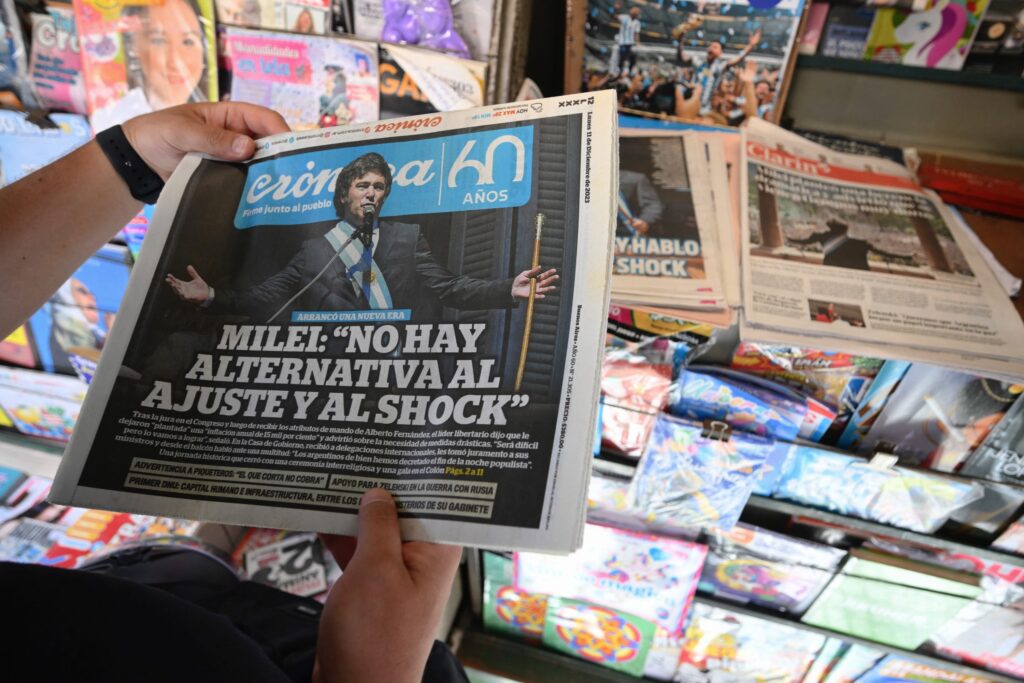IMF’s Summer of Discontent?

Evita, the Falklands, the Hand of God: if you are an English speaker you have already guessed the subject. For the Spanish-speaking world, the key terms would be different: Peronismo, Malvinas, and, again, Maradona. But irrespective of language there is a more robust set of signifiers that (all too often) effectively describes Argentina’s zeitgeist: Inflation, debt, and the International Monetary Fund (IMF). And it’s the last that will be the central protagonist of this story.
Rotten governance in Argentina is undoubtedly to blame for the country’s knocking on the IMF’s door to the point of becoming it largest debtor. But what about the IMF? How are they reacting to newly-inaugurated President Javier Milei’s promise of a radical reboot via old-line shock therapy? In a world in which “we are all post-neoliberals now” (in the way that we were all Keynesians once upon a time) has the progressives’ Darth Vader, the International Monetary Fund, mended its ways? Can it push back against the paleo-austerity ideas of President Milei? Or will the world find out that the world’s last neo-liberal, an Argentine far-right devotee of libertarian economics, is just the ticket for the IMF’s return to form?
Before we go there let’s rewind and travel back to the annus horribilis of 1976. On 29 March, a civilian-military coup deposed Isabel Perón, who had assumed the presidency after her recently returned husband Juan died in 1974, and made Jorge Rafael Videla the de facto president of Argentina. U.S. support for the armed force’s infamous repression has been documented by historian Greg Grandin who cites the late Henry Kissinger’s advice to Argentine Vice Admiral Augusto Guzzetti (Videla’s Foreign Minister) a year before the coup: “If there are things that have to be done, you should do them quickly […] But you should get back quickly to normal procedures.” It is now common knowledge that such was the feverish state of the Cold War in “the tropics.” It is less known is that Argentina’s problematic relationship with the IMF escalated precisely then. During the country’s period of military rule, the government increased its foreign borrowing, from $8.3 billion in 1976 to $43.6 billion in 1983. 1 A devastating increase that would send Argentina into a virtual vortex.
A few months after the coup, half a world away, in the autumn of 1976, James Callaghan, the last Labour Prime Minister before Margaret Thatcher’s neoliberal overhaul, had to knock on the IMF’s door and obsequiously appeal for a bailout of $3.9 billion to keep the UK economy afloat. It was the largest amount ever requested from the IMF to date and marked, in good part, the end of the post-war economic consensus. The IMF demanded $2.5 billion in public spending cuts in return for the loans. The political “readjustments” that followed the “sterling crisis” became known as the “winter of discontent.” According to National Security Archives’ documents, it was likely that a Cold War rationale was what convinced Callaghan to push his leftish comrades to accept the terms imposed by the IMF. A year before the sterling devaluation, Henry Kissinger cabled London and warned against any diminishment of the UK’s defense budget: “Any further defense reductions would weaken Britain’s influence as a NATO ally, with important implications for future European stability” […] “I am sure you are aware that America’s long-term relations with the UK will inevitably have to take into account Britain’s standing as a partner in our common security enterprise.” 2 As Cabinet Minister John Hunt wrote to PM Callaghan in a confidential briefing, further military spending cuts on its nuclear program, or the British Army of the Rhine (BAOR), would “be seen as proof of Britain’s definitive disappearance as a major military power.” Consequently, budget cuts had to be exerted somewhere else: social expenditures. 3 The IMF promptly agreed to the loan in September 1976.
Surprisingly, the origin of the “sterling crisis” was not Labour’s doing but could be traced back to the 1972 Conservative “spend for growth budget” that led to the “Heath–Barber Boom” of 1972–74. Today’s debate on the origin of Argentina’s crisis is weirdly reminiscent of the British debates regarding the origin of the sterling crisis. While self-styled anarcho-capitalist President Javier Milei has, naturally, blamed the debt on his Peronista predecessors, former Economy Minister Martín Guzman counters that it was the preceding Conservative government’s fault. “All the debt with the International Monetary Fund,” Guzman says, “every dollar was taken by the government of Mauricio Macri between 2018 and 2019.” Such is the blame game of Argentine politics.
Argentina’s inflationary nightmares and its own discontent has led to the political ascent of a renewed hyper-ideological form of market fundamentalism. Just when you thought that neo-liberalism was on its knees, the new government has pushed for radical neoliberal reforms, light-years beyond Margaret Thatcher’s wildest dreams. Meanwhile, the IMF flies in and out, negotiating the new and renegotiating what they hadn’t the opportunity to enact before. However, as the IMF tries to burnish its reputation and become an ‘international financial lending institution with a human face’, leaving behind the bad old days of shock therapy that led to so much social suffering, its half-hearted aggiornamento seems to shine brighter in other parts of the world. Once again, Argentina is getting the short-end of the stick.
Not that long ago, in the heady post-pandemic days of 2022, the IMF made headlines in Blighty once again. This time, however, the headlines were inverted and sounded more like the ghost of JM Keynes past. PM Liz Truss’s Chancellor of the Exchequer, Kwasi Kwarteng, presented an orthodox “growth plan” that came to be notoriously known as the “mini budget.” It was slammed by most quarters, including by the BBC’s economics editor, Faisal Islam, who said that he “was taken aback by the interjection of the International Monetary Fund (IMF) in its direct, uncompromising, unflinching and somewhat humiliating criticism of the government’s fiscal plan.” 4 The IMF, in a veritable volte-face, was pushing not to be once again the IMF of yesteryear, and was anxious that such dramatic tax cuts would have a marked effect on inequality levels and stifle any possible economic recovery. It invited the UK Government “to consider ways to provide support that is more targeted and re-evaluate the tax measures, especially those that benefit high income earners.” The departure of Britain’s shortest serving prime minister happened a few weeks later.
This whole episode was seen as testimony of the aggiornamento that the IMF had been painfully adjusting since the coming-to-God moment of the global financial crisis of 2008. In 2011, economists Andrew Berg and Jonathan Ostry published for the IMF a seminal comparative study that showed the effects of inequality on economic growth. It argued that countries can grow unequally for some years (the cases of Brazil, Cameroon and Jordan were illustrations); however, they fail to sustain growth rates in the long term (generally they do not go beyond five years without having periods of stagnation or recession). 5 A decade later, in 2021, another IMF paper confirmed the findings: “The impact of poverty and inequality on growth is likewise ambiguous, as several channels mediate the relationship. But most plausible mechanisms suggest that poverty and inequality reduce growth, at least in the long run. Policies play a role in shaping these relationships and those designed to improve equality of opportunity can simultaneously improve inclusiveness and growth.” 6 At the IMF the term “inclusive growth” has now been socialized. After Zambia defaulted on its foreign debt in 2020, the IMF approved a $1.3 billion program “to help Zambia restore economic stability and promote spending on social programs.” 7 Since then, the social aspects of the program have been deemed a success.
Argentina’s situation arguably poses greater challenges than Zambia’s, yet the IMF’s stance on social and economic justice has been reserved. Kristalina Georgieva, the Managing Director of the IMF, conveyed a congratulatory message to President Milei, expressing hopeful anticipation for Argentina’s robust plan to “safeguard macroeconomic stability and promote inclusive growth for all Argentinians.” Subsequently, the IMF Communications Department issued a celebratory press release, endorsing the measures announced by Argentina’s new Economy Minister, Luis Caputo, aimed at improving public finances, protecting the vulnerable, and strengthening the foreign exchange regime.
However, it is crucial to pause and emphasize that the measures announced in mid-December 2023 went beyond a bundle of sensible policies. The proposal included a sweeping emergency decree and a proposed “omnibus law” deregulating critical economic sectors, including labor, commerce, real estate, aviation, health—even football clubs. The “omnibus law” comprised over 600 articles modifying about twenty existing laws, with a section dedicated to State reform proposing the privatization of nearly 40 state-owned companies. The electoral reform chapter suggested eliminating Primaries, Open, Simultaneous, and Mandatory Elections (PASO) and changing the composition of the Chamber of Deputies. It also aimed to expand presidential powers to legislate without Congress and reduce the right to protest. The new and different IMF, however, did not say a peep. In the meantime, Congress has been struggling to find a negotiated balance with Milei’s stubborn push.
On January 10 this year, the IMF reached a staff-level agreement with the new government, issuing another hopeful press release emphasizing “macroeconomic stability” and only vaguely mentioning a “scaling-up of social assistance to protect the most vulnerable.” 8 Despite the new administration’s announcement of increases in child allowances and food stamps, the initiative pales considering that inflation soared beyond 200%, poverty levels surpassed 40%, and Minister Caputo announced cuts in subsidies to fuel and transport. The more than 50% devaluation of the Argentinian peso was more dramatic than expected, with senior analysts anticipating negative effects on imports, positive effects on exports, and significant increases in inflation.
President Milei promised shock therapy and he is delivering on it. While the IMF might have privately suggested caution to the libertarian government, it would do well to publicly urge for a balance between ideological ambition and factual realism. So far, the celebratory tone and lack of public concern about Milei’s uber-radical proposals should not be taken lightly. The legitimacy of the IMF is now being tested in Argentina, the same country it has tried to assist multiple times in the past. As Milei draws attention to Thatcher’s painful legacy and unions protest outside the Casa Rosada, the memory of Callaghan’s winter of discontent following an IMF loan becomes an uncomfortable yet apposite analogy for what increasingly feels like Argentina’s own summer of discontent.
In 2019, the IMF published a self-assessment of the fund’s lending operations since the global financial crisis: the infelicitously-named Review of Program Design and Conditionality (RoC). The RoC suggested to IMF Directors “a move toward more realism, granularity, gradualism, and parsimony in programs…” as well as “increased focus on the quality of social spending and the impact of program policies on poor and vulnerable groups.” The document also states that “additional attention to political economy risks would be prudent” and invites the IMF to underpin its renewed focus on social spending by having “early engagement with authorities on the topics.” 9 Has the IMF done all that with Milei’s libertarian government? Or is the possibility of radical macroeconomic stabilization too tempting to be blocked by social concerns?
There are indications that the IMF is proceeding cautiously: the new agreements are to pay off debt, they do not encompass new funding. But is this stance an effort to respect Argentina’s sovereignty, anxiety to avoid responsibility for another spectacular default, or an expression of the IMF’s abiding economic preferences?
In such an iconic case, the IMF should use the opportunity to communicate openly about its own lessons learned, reflect publicly on past mistakes, especially considering the challenging economic times for Argentines, as well as the country’s complicated political economy and risks of instability. While the IMF doesn’t directly negotiate with domestic political actors namely Congress or unions, transparent communication is crucial for ensuring “buy-in from domestic stakeholders.” In the IMF’s “RoC,” one of the lessons to be incorporated in future engagements is to “improve communication to support broad public buy-in.” The IMF runs the risk that opaque social concerns may be perceived as worse than having no social concerns at all. It has an opportunity to showcase how it balances macroeconomic stability with the equally vital duty of poverty reduction and inclusive growth.
Milei’s bombastic speech in Davos bizarrely asserted that “the West is in danger because those who should defend it have been co-opted by socialism” and accused international organizations of embracing ‘collectivism’. The IMF, presumably one of the socialists/collectivists, has pre-approved a $4.7bn disbursement of the country’s $43bn loan program. The decision is pending confirmation by its board, and yet, at this point, the critical question is not really the amount, but the policies that will accompany the new stabilization program. Despite Milei’s inflammatory and bullying remarks, it took merely hours for deputy managing director, Gita Gopinath, to announce to the Financial Times that the new administration had “moved boldly to correct several of the misalignments that are there in the economy.” 10 IMF’s Managing Director Kristalina Georgieva was very clear when she told CNN’s Richard Quest: “The Argentine economy is in such bad shape that it has to be shaken up. President Milei and his team are doing exactly that.” 11
In the nineties, shock therapy caused significant economic loss and hindered the ability of economies like Russia and Poland to recover faster and better. Viktor Chernomyrdin, the 1990s-era PM of the Russian Federation, famously quipped that “we hoped for the best but things turned out as usual.” The Argentine case, in its Milei moment, is a stress test for the allegedly rehabilitated IMF. Will things turn out as usual despite our best hopes?
- https://larouchepub.com/eiw/public/1989/eirv16n27-19890630/index.html ↩︎
- https://history.state.gov/historicaldocuments/frus1969-76ve15p2/d239 ↩︎
- http://news.bbc.co.uk/2/hi/uk_news/politics/6212557.stm ↩︎
- https://www.bbc.com/news/business-63056417 ↩︎
- https://www.imf.org/external/pubs/ft/sdn/2011/sdn1108.pdf ↩︎
- https://www.imf.org/en/Publications/WP/Issues/2021/03/12/Links-Between-Growth-Inequality-and-Poverty-A-Survey-50161 ↩︎
- https://www.theguardian.com/global-development/2022/sep/02/crisis-hit-zambia-secures-13bn-imf-loan-to-rebuild-stricken-economy ↩︎
- https://www.imf.org/en/News/Articles/2024/01/10/pr2405-argentina-pr2405-imf-staff-authorities-reach-sla-seventh-review-under-eff-arrangement ↩︎
- https://www.imf.org/en/Publications/Policy-Papers/Issues/2019/05/20/2018-Review-of-Program-Design-and-Conditionality-46910 ↩︎
- https://www.ft.com/content/f9b47684-6f25-4d72-ba8b-a32051489b8e ↩︎
- https://edition.cnn.com/2024/01/17/economy/milei-argentina-speech-world-economic-forum/index.html ↩︎


